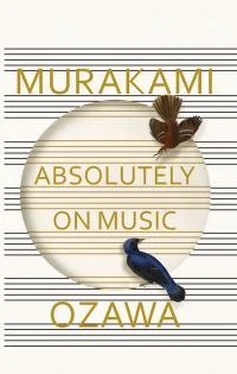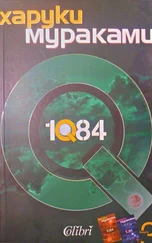MURAKAMI: You know, as a layman, I would have expected a place like the Vienna State Opera, just dripping with history, to be a hotbed of conspiracy and intrigue.
OZAWA [ laughing ]: That’s what everybody says. But it’s not like that at all. Or maybe I’m just especially unaware of such things.
MURAKAMI: You mean to say there wasn’t a lot of political maneuvering?
OZAWA: Oh, that. I try not to let myself get involved in such things. In Boston, too, I kept as far away from that stuff as I could. I don’t do it anywhere, not even in Japan. And in Vienna, it was probably a good thing that my German was so bad. Of course, it can be inconvenient when you don’t know the language, but it can be all the more convenient at times, too. So my eight years in Vienna were truly enjoyable. I could do practically any opera I wanted, and I was constantly surrounded by different productions of operas to see.
MURAKAMI: You were in opera heaven.
OZAWA: Yes, but—I hate to admit it—I almost never saw an opera from beginning to end. I used to go for the high points and leave. [ Laughter. ] It was terrible of me, I know.
MURAKAMI: What a waste! On the other hand, operas do tend to be very long.
OZAWA: I would go just for the high points and go back to my office in the opera house and work. Of course, I probably should have sat there for the whole thing, but I was so busy during the day that I just couldn’t spare that much time. I had rehearsals with the Vienna Philharmonic, and studio rehearsals for the next opera. A “studio rehearsal” is just a session with piano accompaniment. With three hours of one in the morning and three hours of the other in the afternoon, I was exhausted by the end of the day and didn’t have the energy for another three hours or more of a whole opera. I needed to eat, too! [ Laughter. ]
MURAKAMI: Well, sure, opera was originally intended for persons of leisure. A few years ago, while you were still music director, I went to Vienna and saw a whole series of operas. I’d see an opera, I’d go to a Vienna Philharmonic concert, and then to another opera, and there were some matinee performances. It was sheer bliss. Please get well and do more opera in Vienna!
In a Little Swiss Town
I HAD THE privilege of being present at nearly all the activities of the Seiji Ozawa International Academy Switzerland from June 27 to July 6, 2011. The academy is a seminar for young string players directed by Seiji Ozawa and based in the little town of Rolle on the banks of Lake Geneva near Montreux. It is held over a ten-day period every summer, and this was its eighth year.
Outstanding string players, mostly in their twenties, are brought together from all over Europe for a retreat, during which time they receive instruction. They live and practice together in a kind of cultural center run by the town. The facilities are quite luxurious for such a small town. The center is situated by the lake in an extensive, lush green property. The buildings appear to be old, and they have a rich history. Beyond the wide-open windows, ferryboats occasionally cross the lake waters, with the flags of the countries they connect— France and Switzerland—fluttering pleasantly on each boat’s bow and stern.
Under Seiji Ozawa’s direction, such world-class string players as Pamela Frank (violin), Nobuko Imai (viola), and Sadao Harada (cello) guide the students; and Robert Mann, a truly legendary figure who played first violin with the Juilliard String Quartet for half a century, comes from America as special instructor. Of course there is no end to the number of applicants who want to participate in such an illustrious seminar, and thus a rigorous audition process is held in advance to ensure that only truly outstanding talents are admitted—the cream of Europe’s young musicians.
The string quartet is the focus for instruction. Three members of the faculty circulate from one quartet to another, listening to each rehearsal and offering advice on subtle points of tempo or tone or balance. This is not so much instruction as it is valuable advice from older professional colleagues who are not there to suggest that their young charges “do it this way,” but rather that “it might be better to do it like this, don’t you think?” As far as “instruction” is concerned, the young musicians gathered here have (probably) received more than enough. What they require is something a step above instruction. This is the shared recognition that underlies the entire seminar—it is about the comradeship of fellow musicians. Ozawa also attends from time to time and offers his own pieces of advice.
Robert Mann provides yet another level of special guidance in the form of master classes. The large room in which these classes are held is always filled to capacity. What occurs here is not so much democratic instruction as the sharing of secrets of the musical art, in concentrated form. Practically all the faculty and students gather for these events, giving their full attention to every word uttered by this great mentor of chamber music. I was allowed to attend all of the master classes, and though I know very little about stringed instruments, I found these exchanges profoundly interesting, full of valuable suggestions for the understanding and appreciation of music.
During the day, the students devote themselves to practicing their particular string quartets in the culture center, and then in the evening they walk ten minutes down the lakeshore with their instruments to an old stone building with a tower. This place is called “the Castle.” In the old days it was probably the mansion or manor house of the lord of the domain, while nowadays it is apparently preserved by the town. The rehearsals of the large ensemble pieces played by the entire student body are held in this high-ceilinged, lavishly decorated hall where the lord likely held fancy balls. Its walls are covered in portraits and, during my visit, its many windows were usually thrown open to the summer light.
The orchestra’s rehearsals are open to the citizens of Rolle. Many people show up every night to enjoy the spectacle, seated in the folding chairs that have been arranged just for them. Against the still-bright sky beyond the windows, swallows soar past each other in such numbers that, in pianissimo passages, the cries of the birds are louder than the music. After an hour or so of rehearsal, the audience sends warm applause to the musicians who have entertained them. Such appears to be the intimate tie between the academy and the people of the town. Music has taken root as a fixed part of their everyday lives.
The orchestra is conducted by Ozawa and Mann. The pieces chosen for performance this year are Mozart’s Divertimento K. 136, conducted by Ozawa, and the third movement of Beethoven’s String Quartet no. 16, conducted in a string-orchestra version by Mann. They have also readied the first movement of Tchaikovsky’s Serenade for Strings for use as an encore piece. This one is conducted by Ozawa.
In this way, the academy’s students are honing their musical skills from morning to night with hardly a break, literally immersed in music every day. These are all young men and women in their twenties (slightly more women than men), so although they are busy, they also manage to find time to enjoy their youth. They take their meals together, chattering throughout, and when rehearsals are finished, they head out to the bars for fun and relaxation—and, naturally enough, there seems to be a little romance in the making, too.
I was being allowed to participate as a kind of “special guest.” Maestro Ozawa told me, “You should absolutely come to Rolle and see with your own eyes what we do there. It will change the way you listen to music.” And so I had set out for Switzerland, intrigued, but not quite convinced that the experience would “change the way” I listened to music. I flew into the Geneva airport, headed for Rolle in a rental car, and attended the seminar from its second day on. There were no hotels where I could stay in Rolle (the number of hotels in such a small town is quite limited), so I ended up staying in Nyon, another town on the lakeshore, about a fifteen-minute drive away. There were several excellent restaurants near the hotel that served fish taken directly from the lake. The town on the opposite shore was in France. Far off to the right, in sharp outline, were the snow-capped Alps.
Читать дальше











